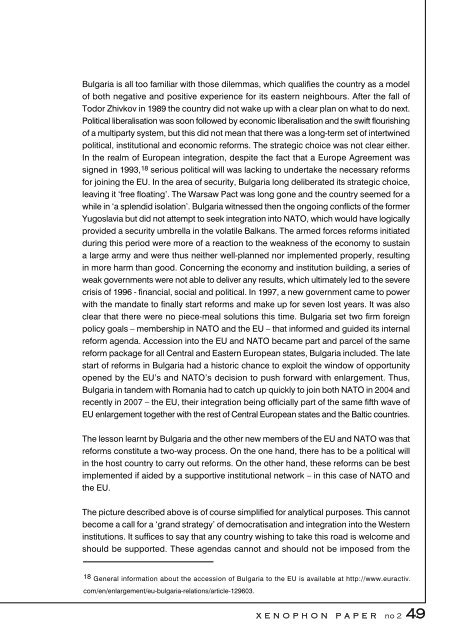Xenophon Paper 2 pdf - ICBSS
Xenophon Paper 2 pdf - ICBSS
Xenophon Paper 2 pdf - ICBSS
You also want an ePaper? Increase the reach of your titles
YUMPU automatically turns print PDFs into web optimized ePapers that Google loves.
Bulgaria is all too familiar with those dilemmas, which qualifies the country as a model<br />
of both negative and positive experience for its eastern neighbours. After the fall of<br />
Todor Zhivkov in 1989 the country did not wake up with a clear plan on what to do next.<br />
Political liberalisation was soon followed by economic liberalisation and the swift flourishing<br />
of a multiparty system, but this did not mean that there was a long-term set of intertwined<br />
political, institutional and economic reforms. The strategic choice was not clear either.<br />
In the realm of European integration, despite the fact that a Europe Agreement was<br />
signed in 1993, 18 serious political will was lacking to undertake the necessary reforms<br />
for joining the EU. In the area of security, Bulgaria long deliberated its strategic choice,<br />
leaving it ‘free floating’. The Warsaw Pact was long gone and the country seemed for a<br />
while in ‘a splendid isolation’. Bulgaria witnessed then the ongoing conflicts of the former<br />
Yugoslavia but did not attempt to seek integration into NATO, which would have logically<br />
provided a security umbrella in the volatile Balkans. The armed forces reforms initiated<br />
during this period were more of a reaction to the weakness of the economy to sustain<br />
a large army and were thus neither well-planned nor implemented properly, resulting<br />
in more harm than good. Concerning the economy and institution building, a series of<br />
weak governments were not able to deliver any results, which ultimately led to the severe<br />
crisis of 1996 - financial, social and political. In 1997, a new government came to power<br />
with the mandate to finally start reforms and make up for seven lost years. It was also<br />
clear that there were no piece-meal solutions this time. Bulgaria set two firm foreign<br />
policy goals – membership in NATO and the EU – that informed and guided its internal<br />
reform agenda. Accession into the EU and NATO became part and parcel of the same<br />
reform package for all Central and Eastern European states, Bulgaria included. The late<br />
start of reforms in Bulgaria had a historic chance to exploit the window of opportunity<br />
opened by the EU’s and NATO’s decision to push forward with enlargement. Thus,<br />
Bulgaria in tandem with Romania had to catch up quickly to join both NATO in 2004 and<br />
recently in 2007 – the EU, their integration being officially part of the same fifth wave of<br />
EU enlargement together with the rest of Central European states and the Baltic countries.<br />
The lesson learnt by Bulgaria and the other new members of the EU and NATO was that<br />
reforms constitute a two-way process. On the one hand, there has to be a political will<br />
in the host country to carry out reforms. On the other hand, these reforms can be best<br />
implemented if aided by a supportive institutional network – in this case of NATO and<br />
the EU.<br />
The picture described above is of course simplified for analytical purposes. This cannot<br />
become a call for a ‘grand strategy’ of democratisation and integration into the Western<br />
institutions. It suffices to say that any country wishing to take this road is welcome and<br />
should be supported. These agendas cannot and should not be imposed from the<br />
18 General information about the accession of Bulgaria to the EU is available at http://www.euractiv.<br />
com/en/enlargement/eu-bulgaria-relations/article-129603.<br />
X E N O P H O N P A P E R no 2 49









